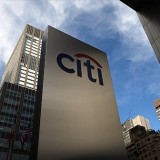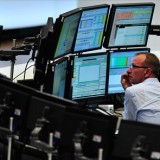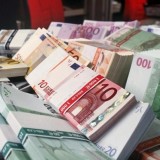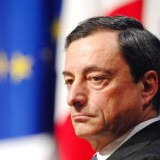Posted on 25 July 2014. Tags: Visa
Visa reported higher profits and revenues for the second quarter of 2014, but its shares fell sharply after the submission of the report. The reason for this was cut in forecast revenues for the fiscal year. The net profit of Visa in the second quarter, which is the third fiscal year of the company amounted to 1.36 billion USD or 2.17 USD per share. An year earlier the financial result was 1.23 billion USD or 1.88 USD per share. The revenue of the largest operator of credit and debit cards increased by 5.1% to 3.16 billion USD. The expectations of analysts were for earnings of 2.10 USD per share on revenue of 3.15 billion USD.
Despite the improved results of Visa shares fell 3% to 216 USD per share after the publication of the report. The investors saw the disturbing signals in the cautious expectations of the company throughout the year as the outlook for revenue growth was a train of 10-11% to 9-10%. This caused some concern and the growth rate of under international payments in the last quarter. They amounted to 854 billion USD, while the overall volume of quarterly transactions with Visa cards increased by 11.5% to 1.19 trillion USD.
By Visa expect some crosswinds continue to affect the company in the short term, but felt that new technologies and relationships with financial institutions and merchants will help achieve double-digit revenue growth in the long term. The model of Visa and MasterCard, is associated with receipts from financial institutions who use the cards of both the operator. They themselves do not issue cards and do not charge interest, but earn in making payments in their networks.
Posted in Finance
Posted on 25 July 2014. Tags: Easyjet
After revenue growth in the third quarter of its fiscal year by 8.6% to 1,240 billion GBP, Easyjet expects higher profit for the year. Despite the political turmoil in Israel, Egypt and Ukraine airline expects profit before tax for the year to grow by 19%. The revenue from one place increased by 2.7% at constant currency and 1.7% in the reporting base to 62.47 pounds for a place despite the less favorable operating environment and the significant increase in the capacity of easyJet airport Gatwick. The growth is mainly due to the active days around Easter falling in the third quarter of the financial year and the extensive online marketing initiatives and activities for the period.
“EasyJet again achieved strong performance in the third quarter, transported 17.9 million passengers and noting 8.6% revenue growth. We will continue to invest in building the leading network and at the same time trying to attract new passengers, keeping low prices and realized returns and profitable growth for shareholders”, said the CEO Carolyn McCall.
The cost for a seat, excluding fuel, increased by 1% at constant currency or decreased by 1.3% reporting basis, improving expectations presented in May. The increase at constant currency due to increased airport charges at regulated airports, especially in Italy, with planned annual maintenance costs and lease. At the same time the airline capacity increased by 6.8% for the quarter, driven primarily by 16% growth in capacity of the airport Gatwick mainly due to the acquisition of slots at airline Flybe, and a 7% increase in airport Rome Fiumicino. The slot is a short time period given by the air dispatch station, in which a plane has to take off.
“With 77% already reserved seats in the second half of the year, easyJet expects annual profit before tax to be between 545-570 million pounds, compared with 478 million pounds in the last financial year, provided that there are no significant breaks in the activity. This expected profit includes events affecting the markets in Israel, Egypt and Moscow”, says McCall.
However, investors are not rewarded presentation because the consensus estimate of their annual profit above forecast range. At the beginning of the session shares shrank by over 8% but not over trade neutralized part of the decline to 4.4%.
Posted in Business
Posted on 25 July 2014. Tags: IMF
IMF lowered forecast for global economy growth this year, due to weaker than expected growth of the US economy and pessimistic forecasts for some key emerging economies. According to the new forecast the world economy will expand by 3.4% this year, which is 0.3% below the previous forecast. The expectations for global growth in 2015 remain unchanged - 4%. The IMF reduces forecast for growth in gross domestic product (GDP) of developed economies by an average 0.4 % to 1.8% this year. The next year growth expectations in developed economies grew by by only 0.1% to 2.4%.
Developed economies sharp correction is forecast for the United States. Fund has lowered its forecast for economic growth to 1.7% this year. Next, the outlook is little changed - an increase of 3%. The forecast for the euro area is preserved - this year, the fund expects 18 countries to record economic growth of an average of 1.1% and next year - 1.5%. More optimistic expectations for the GDP of Spain, with growth forecast has been adjusted by 0.3% up to 1.2% this year and by 0.6% to 1.6% next year.
IMF is optimistic about Japan, as the expectations for growth in the country of the rising sun is higher by 0.3% points this year and by 0.1% next year to 1.6% and 1.1%. The IMF expects growth in developing economies as a whole to slow to 4.6% this year, but next year, accelerating to 5.2%. Sharp correction is in the forecast for Russian GDP - this year’s expected growth of the Russian economy are reduced to 0.2% and next - up to 1%.
The pessimistic is forecast for Brazil and Mexico - in 2014 it is expected the two economies to slow to 1.3% and 2.4%, and next year - up to 2% and 3.5%.
“Global growth could be weaker for a longer period of time, given the lack of strong momentum in developed economies despite record low interest rates and easing other brakes to recovery”, the IMF said.
The International Monetary Fund warned that geopolitical tensions could lead to a sharp rise in oil prices, which is one of the main risks to the global economy. The institution predicts that economic recovery will accelerate in the second half of the year and its engines remain the same - moderate fiscal consolidation and accommodative monetary policy in developed economies. Weak demand, however, seems to be more stable in some regions.
Posted in Economy, Finance
Posted on 25 July 2014. Tags: gold
The price of gold fell below the psychological level of 1,300 USD per ounce on Thursday. The cheaper precious metal dragging with it the price of silver. This happens after the demand for precious metals because of their characteristics of safe haven investment decreases due to positive data on activity in the Chinese manufacturing sector and the labor market in USA.
Demand for gold is created because it is a haven asset weakened after the shares began to pick up speed, and then there is no significant deterioration of the situation in the Middle East and Ukraine. Because of deepening tensions in the Middle East and Ukraine the level of support for gold stays around 1,300 USD per ounce. The contracts on silver for September delivery lost 1.82% of its price to 20.61 USD.
Earlier today it was announced that the Chinese manufacturing activity climbed 18-month high. The PMI index for manufacturing sector rose to 52 points in July. Preliminary data show that the index rose from a revised 50.7 points in June and above the expectations of economists. Their forecast was for an increase to 51 points.
Furthermore, in applications for unemployment benefits in USA dropped to nearly 8.5-year low. The leading indices on Wall Street still respond poorly to the news. However, the investors have an incentive published financial statements of many companies.
Posted in Finance
Posted on 25 July 2014. Tags: S&P 500
The main Wall Street indexed ended the session without a clear direction, and in the last minutes of the session trading turning movement repeatedly. At the end of the trading day S&P 500 managed to conquer a new record high second day. The index value increased by a 0.05% to a level of 1,987.94 points. For the 27th time this year, the index recorded record high, reports Market Watch. After fluctuations in the final minutes the other leading US indices ended the session in the red. Dow Jones decreased slightly with 0.02% to 17,083.8 points. Nasdaq also went down with 0.04% to a value of 4,472.11 points.
Today, the investors have focused on corporate accounts. The influence of the market, turned and mixed data on the development of the US economy. The number of applications for unemployment benefits at the end of last week reached its lowest level in eight years. Meanwhile, the sales of newly built homes in June decreased by 8.1% on a monthly basis. The sales of new homes are about 406 thousand, which was less than market expectations.
Among the biggest losers today was General Motors. The car company reported 80 percent drop in profit for the second quarter, which led to a decrease in the price of its shares more than 5% to a value of 35.40 USD per share. In recent months, GM has been seriously affected by campaigns to tow because of technical defects.
The shares of Caterpillar lost about 3% of its price after the company reported a decline in sales below market expectations, although its profit forecast to surpass. At the same time, Facebook announced profit growth of 140% in Q2 2014. After this news the shares of the social network rose by just over 5% to a price of 75 USD per share.
Within the session, however shares of Facebook briefly traded at a record level of 76.14 USD. This is more than double the price at which the company’s shares went on the market - 38 USD per share.
Posted in Finance
Posted on 24 July 2014. Tags: Brazil
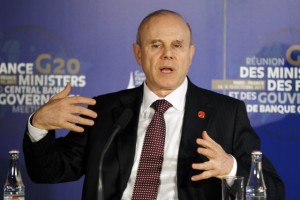 Brazil plans to raise 2 billion USD from government bonds sale. The treasury of Brazil announced that it would sell dollar-denominated bonds and use the money collected for the redemption of outstanding government securities in an attempt to cut costs of servicing the debt. Office did not reveal details about the volume issue. The operation is expected to take place later on Wednesday will be placed bonds maturing in 2045, and the majority of the proceeds will be used for the redemption of securities, expiring in 2024, 2025, 2027, 2030, 2034, 2037 and 2041 the Brazilian government has total debt of about 11.9 billion USD in bonds maturing in the above years.
Brazil plans to raise 2 billion USD from government bonds sale. The treasury of Brazil announced that it would sell dollar-denominated bonds and use the money collected for the redemption of outstanding government securities in an attempt to cut costs of servicing the debt. Office did not reveal details about the volume issue. The operation is expected to take place later on Wednesday will be placed bonds maturing in 2045, and the majority of the proceeds will be used for the redemption of securities, expiring in 2024, 2025, 2027, 2030, 2034, 2037 and 2041 the Brazilian government has total debt of about 11.9 billion USD in bonds maturing in the above years.
The issue comes amid stalled and slow-growing economy in the context of increasing pressure on public finances. Once expanded by only 2.5% in 2013, expected growth of the Brazilian economy to slow to less than 1% this year - a rate that many believe is not typical of a developing country that has yet to deal with tremendous poverty among their populations.
Posted in Economy
Posted on 24 July 2014. Tags: Russia
European Bank for Reconstruction and Development (EBRD) stopped investments in Russia, according to the latest expansion of sanctions on Moscow by the European Union (EU). The institution said in a statement that the majority of the board of directors supported the proposal for disinvestment in Russia. Among the votes, which approved this decision were those of the representatives of USA, Canada, Japan, Australia, New Zealand, Norway and Ukraine.
The Bank will continue to manage their existing investments, which at the end of March amounted to 8.7 billion EUR. About 84% of them are in the private sector, according to the policy of the EBRD to finance this particular part of the economy, unlike other international financial institutions. About 43% of investments are in industry, commerce and agribusiness, other 23% are allocated in the financial sector, 16% are in the energy and 18% are invested in infrastructure.
Russia is the largest recipient of funds from the EBRD, established in 1991 to assist the countries of the former Soviet Union. In the first half of the year the bank invested totally 3.6 billion EUR and 19% of them are oriented towards Russia.
Posted in Economy, Finance
Posted on 24 July 2014. Tags: Unilever
Unilever reported 5.5% decreased revenue for the first half of 2014. The management of the Anglo-Dutch group reiterated weaknesses in emerging markets as the primary cause of the decline. The revenues for the first six months of 2014 amounted to 24.1 billion EUR and justify the market forecasts. The operating profit rose with 13% yoy to 4.4 billion EUR, while the net profit grew with 12% to 3 billion EUR.
By management report that will focus on achieving another year of profit growth. It will also be paid a dividend of 28.5 cents per share. The CEO of the company Paul Polman company describes the results as “fairly good”, but blamed the emerging markets that carry 60% of the revenue for their decline in the first half. In recent years the US QE contributed the movement of capital around the world, and politicians in developing countries are using this investment period to make the necessary reforms to their countries.
Polman assured that Unilever is an important presence in Brazil, India and China, and hopes that the reforms there will materialize in the future. The expectations for Europe are that old continent “will recover slowly and long”.
Posted in Business, Finance
Posted on 24 July 2014. Tags: BASF
The German chemical giant BASF reported 12% net profit increase in the second quarter of 2014. The industrial and chemical division of the company contributed to the strong result, but amid uncertainties over global economic growth and rising geopolitical risk. The net income for Q2 2014 increased to 1.3 billion EUR, while the analysts expected income of 1.45 billion EUR. The revenues of the company grew by 1% to 18.5 billion EUR. The currency fluctuations continue to exert pressure on the financial results. The earnings before interest, taxes, charges and other one-time effects increased by 9% to 2.71 billion EUR.
The management of BASF SE confirms outlook for its financial performance in 2014, but now warns of the effects of weak global economic growth for the rising geopolitical risks.
“We stand behind our forecast for 2014 despite even more unfavorable currency changes and rising political risks”, said the CEO of the company Kurt Bock during the presentation of the quarterly report. The management of the company announced that the release of natural gas trading business and stockpiling by an agreement to exchange assets with Russian gas giant Gazprom will be delayed and carried out in the autumn of 2014. “The difficult legal separation process, including the creation of new companies in Russia, the Netherlands and Germany is taking longer than initially expected”, said Chief Financial Officer Hans-Ulrich Engel.
During the today trading session BASF shares dropped by 3.33% to 80.79 EUR per share. Since the beginning of the year, shares of the company have increased by 9.43%.
Posted in Business, Finance

Posted on 24 July 2014. Tags: European Union
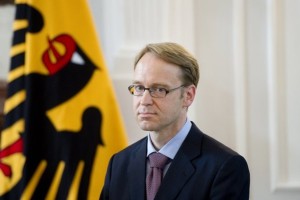 The president of the German central bank Jens Weidmann urged UK to stay in EU and to follow the legacy of Winston Churchill to “restore the European family”. That was announced against the possibility of holding a referendum leaving the economic bloc in 2017. The referendum will be held, provided that the main force in the current coalition government - the Conservative Party won an absolute majority in parliament elections next year. The fear of UK separation from EU grew even more after the Eurosceptic Independence Party (Ukip) in United Kingdom won higher percentage on the European elections.
The president of the German central bank Jens Weidmann urged UK to stay in EU and to follow the legacy of Winston Churchill to “restore the European family”. That was announced against the possibility of holding a referendum leaving the economic bloc in 2017. The referendum will be held, provided that the main force in the current coalition government - the Conservative Party won an absolute majority in parliament elections next year. The fear of UK separation from EU grew even more after the Eurosceptic Independence Party (Ukip) in United Kingdom won higher percentage on the European elections.
A lot of links connect UK with the rest of Europe and this integration brings benefits to both parties, said Weidmann on a meeting of the Chambers of Commerce in the UK and Germany. He was an outspoken supporter of Britain’s membership of the European single market, but for the first time addressed a similar impassioned appeal to their British counterparts.
Amid the growing public support to Ukip, the position of the business to the membership of the crown in the EU is more heterogeneous. Fears of a referendum on Britain staying in the Union have become one of the main problems facing British business. While much of it supported the ideas for reform in the economic bloc, many fear that uncertainty could hurt investor confidence. Half of British trade is with the rest of EU, its membership in the EU has increased its exports outside the single European market by about 50%, according to studies cited by Weidmann. He cites a survey of London School of Economics, under which EU membership has brought the British GDP growth of over 10%.
Even better results would have been possible if Britain and Germany join efforts in reforming the Single Market for services. While the EU has managed to make the market more competitive goods, this service remains fragmented, said Weidmann. The president of the German central bank urged the UK to support changes to the rules relating to the digital economy, arguing that they will improve competitiveness.
“The European Union is still divided into 28 separate digital markets, which slows down innovation, growth and employment” he finished.
Posted in Comments, Finance




